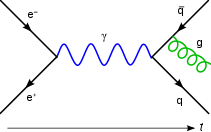| Quantum field theory |
|---|
 |
| History |
In theoretical physics, specifically quantum field theory, a beta function, β(g), encodes the dependence of a coupling parameter, g, on the energy scale, μ, of a given physical process described by quantum field theory. It is defined as
and, because of the underlying renormalization group, it has no explicit dependence on μ, so it only depends on μ implicitly through g. This dependence on the energy scale thus specified is known as the running of the coupling parameter, a fundamental feature of scale-dependence in quantum field theory, and its explicit computation is achievable through a variety of mathematical techniques. The concept of Beta function was Introduced by Ernst Stueckelberg and André Petermann in 1953.[1]
- ^ Stueckelberg, E.C.G.; Petermann, A. (1953). "La renormalisation des constants dans la théorie de quanta". Helv. Phys. Acta (in French). 26: 499–520.
